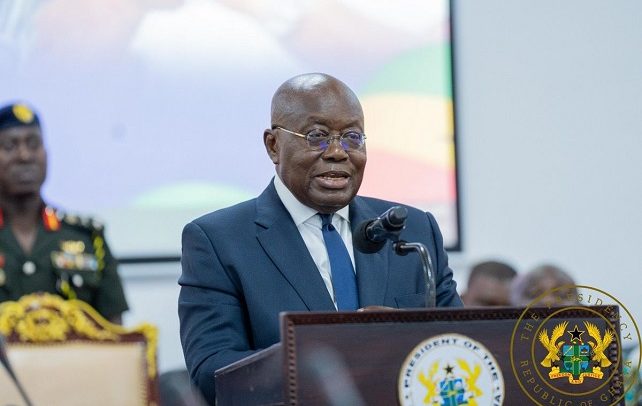President Akufo-Addo believes Ghana as a country still has a long way to go when it comes to development.
He, however, admits there has been some level of growth over the years.
But insist there is still more to be done to achieve the expected development.
This was when he addressed attendees of the 2023 President’s Independence Day Awards held in Accra ahead of the country’s 66th independence anniversary celebration scheduled for Volta Region on Monday, March 7, 2023.
He noted, “we must have the pride to acknowledge we have made positive strides and we must also have the humility to appreciate that we still have a long way to go.
He has, therefore, made a passionate appeal for Ghana to eschew all forms of self-centeredness and divisiveness for the sake of the collective development of the nation.
In spite of the challenges the nation face, he insisted a lot has been achieved by the nation, and the citizenry must have the propensity to celebrate the achievements and to acknowledge the collective challenges of the state.
“As we prepare to celebrate 66 years of independence from the British colonial power on the theme: ‘Our Unity, Our Strength, Our Purpose,’ the formal commemoration of the anniversary taking place in Ho and Adaklu, in the Volta Region, let us eschew all acts of divisiveness and self-centered tendencies which will only retard our forward march,” was his charge.
Apart from that, he said “we must have the patience to accept that just as our fight for freedom and independence was not achieved in a day, so too our national prosperity will not come overnight” and that “we will have to work hard for it.”
He was, however, optimistic that “in peace and unity, I am certain that we can build a new Ghanaian civilisation that will attract the admiration of Africa and the world.”
In a brief statement, Minister for Education, Yaw Osei Adutwum said over 500,000 students have so far been placed in various senior high schools across the country in the ongoing 2023 school placement exercise.
He also commended the awardees for their achievement whilst urging them not to relent in their efforts to climb up the academic ladder at the various senior high schools they have been admitted to.
Managing Director Nestlé Ghana Limited, headline sponsor of the President’s Independence Awards, Georgios Badaro, on his part, applauded the award recipients for their achievements.
He noted that for 16 years, Nestlé has supported the awards in collaboration with the Ministry of Education and the presidency of Ghana to reward Ghanaian students and talents who excel in the Basic Education Certificate Examinations (BECE).
“We [Nestlé] do this because we believe that recognising, celebrating, supporting the achievements of our young talents can only urge them and motivate them to stay on course of their growth and development,” Georgios Badaro said.
The Awards
The ceremony saw the President presenting awards to 36 deserving students for the year 2021, and 36 students for the year 2022, bring the total to 72. The 2021 ceremony was postponed due to the COVID-19 pandemic and was therefore inculcated into the 2022 edition.
The President’s Independence Day Awards, since its inception in 1993, annually rewards young, brilliant students (male and female) between the ages of 14 and 19 from all the regions of Ghana.
The awardees are selected based on their exceptional academic performances in the Basic Education Certificate Examination (BECE). The objectives are essentially, to recognise and reward academic excellence and to promote and encourage students with additional educational needs.
The criteria used in selecting the awardees are excellent performance in the 2021 & 2022 BECE.
The overall best male and female students from public schools in the 16 regions are selected based on their raw scores obtained from the West African Examination Council (WAEC).
Overall best male and female students with additional educational needs such as visual and hearing impairments are also selected to receive awards. Where there is a tie, the core subjects (English, Mathematics, General Science, and Social Studies only) are used to break the tie.
To ensure absolute transparency and fairness, the best male, and female students from public schools in each region are selected based on the raw scores obtained from WAEC.
These students become the representing awardees for their regions. For inclusivity, the four overall best male and female students with visual and hearing challenges are also selected based on their BECE raw scores.
By Charles Takyi-Boadu


